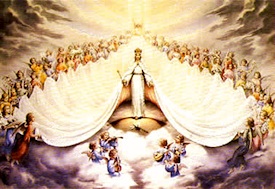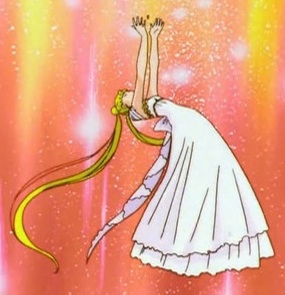Hello dear sisters in Our Mother.
I have a question that has long puzzled me and caused me issues. What is the origin of demons?
One thing I have always believed is that Our Mother God created us in the beginning to be perfect and that nothing she creates is for naught. So it always puzzled me as to where demons come from. We know they exist but they can't have always been evil as Our Lady only creates good.
Now I am not saying as some people might accuse me of thinking something similar to what Christians think of demons being fallen Janyati. This is not true as we know that the Janyati can not fall as they are Dea herself.
However this is a question I have yet to answer. Maybe you maids can help me?
____
The demon question is a complex one. A lot of the problem comes from the Western mentality of taking individuality very literally. From angels to demons to incarnate Axial beings like ourselves, Western culture tends to regard the individual as something fixed and absolute, perhaps the center of all absoluteness (which of course is the fundamental heresy of the West). Even the Persons of Dea in the Christian rendition are often seen as something absurdly akin to "individual people" as opposed to manifestations of the Absolute.
Now manifestation itself (or Creation if one prefers that term) is, by definition, deployment (or apparent deployment) of the All-Possibility outside the One. Since the One, or Dea is Good Itself there must be a degree to which deployment "outside" Her must be non-good. That will range from the mixture of good and non-good that each of us finds in herself to "beings" that personify or symbolize the non-good.
To what extent demons are beings in the same sense that we are (and indeed to what extent we are really totally atomized individuals) is a subtle matter and one that is hugely distorted by the Western individualism that has grown up since the 6th century BC and become hugely exaggerated since the so-called "enlightenment" and again since the pseudomythos era of the late 19th century.
In other words, demons are first of all a cosmological phenomenon that necessarily takes place in a universe that is not Pure Good (and if it were, it would be the One and not manifest at all).
On the more everyday level, of course, we may and should simply see them as the Enemy that we are here to overcome both inside and outside ourselves.
Author Archives: A Weblog for Our Mother God
The Exalatation of the Queen of heaven
 May 1st/Maia 14th is the Feast of the Exaltation of the Queen of Heaven.
Read about this beautiful festival, its history and meaning.
May 1st/Maia 14th is the Feast of the Exaltation of the Queen of Heaven.
Read about this beautiful festival, its history and meaning. Doki Doki Precure and the True Heart
A new essay at Happy Innocent Musume Senshi discusses the Metaphysical implications of a current Japanese anime with reference to Filianic Scripture.


Doki Doki Precure and the True Heart
A new essay at Happy Innocent Musume Senshi discusses the Metaphysical implications of a current Japanese anime with reference to Filianic Scripture.


The Demon Planets
The three outer planets, Uranus, Pluto and Neptune have become the darlings of many modern astrologers, but the traditional view of the cosmos had no place for them (even though some ancients were aware of their existence). Are they in fact bodies of no particular importance? Fly-specks on the cosmic map? Or are they something darker and more sinister? A new article argues for a fundamental connection between the three Outer Demons and the Three Poisons of the modern world described in The Feminine Universe.
The Demon Planets
The three outer planets, Uranus, Pluto and Neptune have become the darlings of many modern astrologers, but the traditional view of the cosmos had no place for them (even though some ancients were aware of their existence). Are they in fact bodies of no particular importance? Fly-specks on the cosmic map? Or are they something darker and more sinister? A new article argues for a fundamental connection between the three Outer Demons and the Three Poisons of the modern world described in The Feminine Universe.
The Symbolism of Fairy Tales
A new article on the Symbolism of Fairy Tales may be of interest to our readers. It talks of the deeper divine meaning of traditional tales. Not strictly Deanic, but feminine-friendly and good on metaphysical symbollism.


The Symbolism of Fairy Tales
A new article on the Symbolism of Fairy Tales may be of interest to our readers. It talks of the deeper divine meaning of traditional tales. Not strictly Deanic, but feminine-friendly and good on metaphysical symbollism.


The Symbolism of Fairy Tales
A new article on the Symbolism of Fairy Tales may be of interest to our readers. It talks of the deeper divine meaning of traditional tales. Not strictly Deanic, but feminine-friendly and good on metaphysical symbollism.


Anime and God the Daughter
 A new article on the Shining World social network argues that anime often uncannily reflects the Mythos of God the Daughter, and that this occurs because the story, while largely unknown in the patriarchal world, is deeply ingrained in the human psyche. Read this fascinating account.
A new article on the Shining World social network argues that anime often uncannily reflects the Mythos of God the Daughter, and that this occurs because the story, while largely unknown in the patriarchal world, is deeply ingrained in the human psyche. Read this fascinating account. Anime and God the Daughter
 A new article on the Shining World social network argues that anime often uncannily reflects the Mythos of God the Daughter, and that this occurs because the story, while largely unknown in the patriarchal world, is deeply ingrained in the human psyche. Read this fascinating account.
A new article on the Shining World social network argues that anime often uncannily reflects the Mythos of God the Daughter, and that this occurs because the story, while largely unknown in the patriarchal world, is deeply ingrained in the human psyche. Read this fascinating account. Anime and God the Daughter
 A new article on the Shining World social network argues that anime often uncannily reflects the Mythos of God the Daughter, and that this occurs because the story, while largely unknown in the patriarchal world, is deeply ingrained in the human psyche. Read this fascinating account.
A new article on the Shining World social network argues that anime often uncannily reflects the Mythos of God the Daughter, and that this occurs because the story, while largely unknown in the patriarchal world, is deeply ingrained in the human psyche. Read this fascinating account. Anime and God the Daughter
 A new article on the Shining World social network argues that anime often uncannily reflects the Mythos of God the Daughter, and that this occurs because the story, while largely unknown in the patriarchal world, is deeply ingrained in the human psyche. Read this fascinating account.
A new article on the Shining World social network argues that anime often uncannily reflects the Mythos of God the Daughter, and that this occurs because the story, while largely unknown in the patriarchal world, is deeply ingrained in the human psyche. Read this fascinating account. Easter Hymn for Devotees of Our Mother God
An Easter Hymn for Passiontide, expressing the wasteland quality of the time between the Daughter's death and the New Year with a discussion of the nature of our feminine Easter.
Easter Hymn for Devotees of Our Mother God
An Easter Hymn for Passiontide, expressing the wasteland quality of the time between the Daughter's death and the New Year with a discussion of the nature of our feminine Easter.
Easter Hymn for Devotees of Our Mother God
An Easter Hymn for Passiontide, expressing the wasteland quality of the time between the Daughter's death and the New Year with a discussion of the nature of our feminine Easter.
Descartes imagination and reality
In the bourgeois materialist world shaped by Descartes, imagination and reality are regarded as very distinct. But in fact the modern world-outlook has no real criteria for judging between the two.
Descartes imagination and reality
In the bourgeois materialist world shaped by Descartes, imagination and reality are regarded as very distinct. But in fact the modern world-outlook has no real criteria for judging between the two.
Descartes imagination and reality
In the bourgeois materialist world shaped by Descartes, imagination and reality are regarded as very distinct. But in fact the modern world-outlook has no real criteria for judging between the two.
Anima Mundi and the Human Psyche
What do we mean by the Anima Mundi and what relation does it bear to the human psyche?
Anima Mundi and the Human Psyche
What do we mean by the Anima Mundi and what relation does it bear to the human psyche?
Anima Mundi and the Human Psyche
What do we mean by the Anima Mundi and what relation does it bear to the human psyche?
The Day of Maia
The Day of Maia is a minor festival dedicated to the all-creative principle of nature.
The Day of Maia
The Day of Maia is a minor festival dedicated to the all-creative principle of nature.
The Day of Maia
The Day of Maia is a minor festival dedicated to the all-creative principle of nature.
Happy Eastre Everyone!
Our Lady is Arisen and the New Year 3333 has begun!


Happy Eastre Everyone!
Our Lady is Arisen and the New Year 3333 has begun!


Happy Eastre Everyone!
Our Lady is Arisen and the New Year 3333 has begun!


Happy Eastre Everyone!
Our Lady is Arisen and the New Year 3333 has begun!


A chant for this solemn day
Also see the commentary on this hymn.



